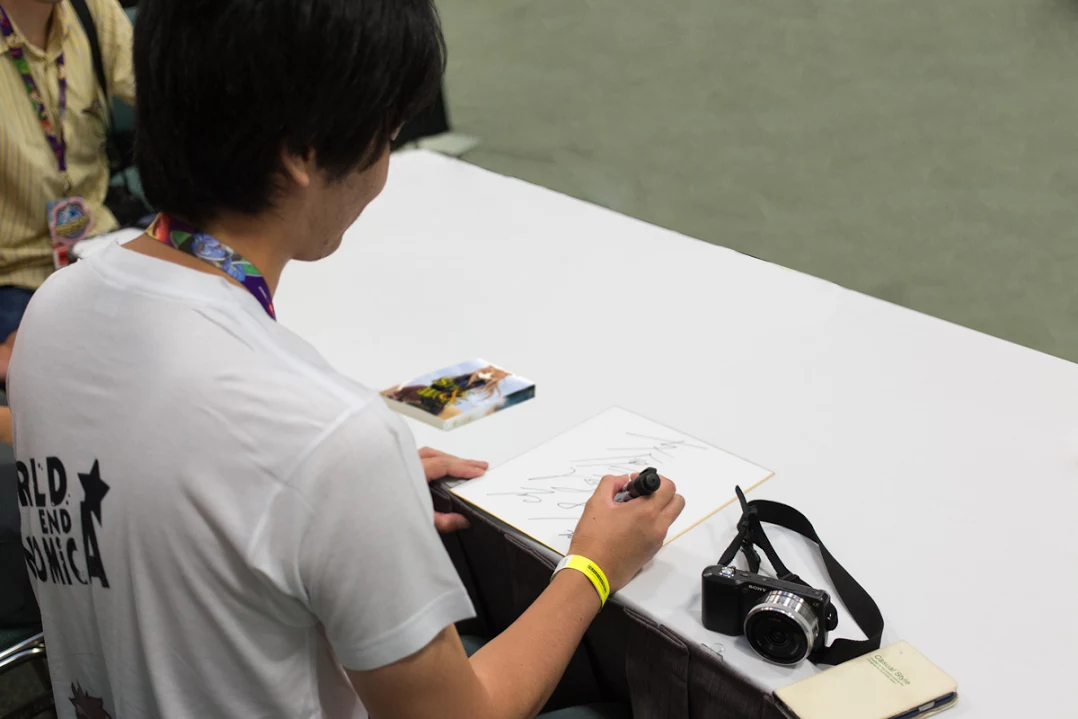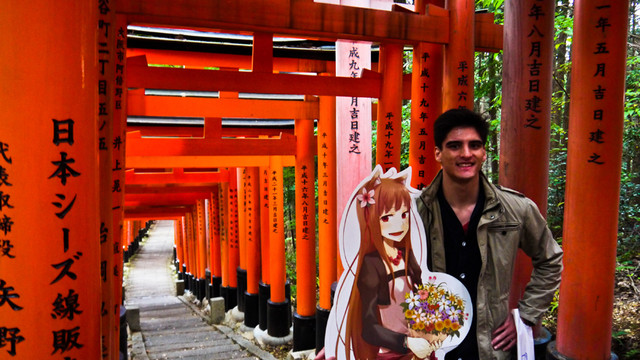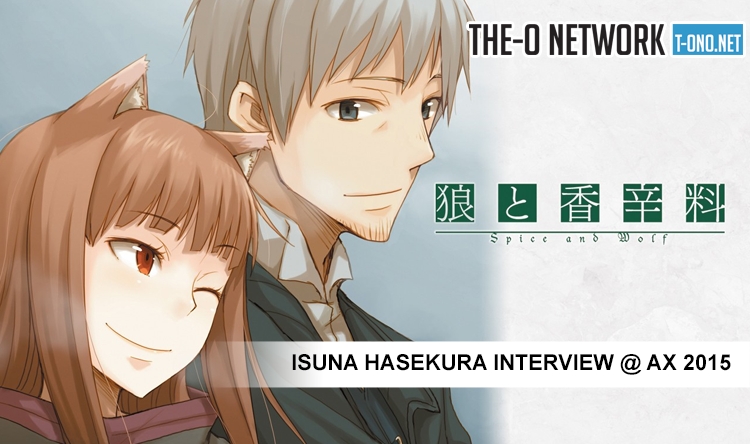As the creator behind the award-winning light novel series, Spice and Wolf, Isuna Hasekura has quickly penned his way into the minds of anime fans worldwide through writing classic storylines focused on economics and how it influences the world. Aside from Spice and Wolf, his portfolio also includes the visual novel World End Economica, which was recently translated and published by Sekai Project. We had a chance to interview him during Anime Expo 2015 and had a chance to ask him about what shaped his work as well as his thoughts about the English translation for World End Economica.
T-ONO: You once said you had hoped to be a manga artist, but became an author instead. What originally drew you to write economics-focused stories instead of other genres? Do you have any genres you particularly like to read? Any favorite books?
Hasekura: Personally I found it difficult to draw, but with a novel I could start writing right away.
I chose to write about economics because it is an interesting subject, like a puzzle. For example, when the U.S. Dollar grows in value in relation to the Japanese Yen, or other currencies, it will change too while other economies that aren’t as connected to the dollar will not. It's a puzzle because one factor affects a whole number of other things and you see what changes and what doesn't. That's what I like about it.
My three favorite genres, in order are economics, anything history related and neurology. My favorite book is Tom Wolfe's The Bonfire of the Vanities.
T-ONO: What has been the most fun part about crafting new world settings and economic systems? Have there been any special things you have used to help you along the way? Any examples?
Hasekura: Truthfully, I don't create original settings and systems. Most of them come from researching historical reference books and other sources of information.
What I find interesting is that I have to consider the everyday lives of the people living in each world. Take the type of clothing someone would wear for example. It's not just "draw the clothing" and you're done. I had to think about what kind of material it was made of (cotton, wool, etc.) and furthermore how the people would take care of the sheep, what tools they would use to harvest the wool and so on. The cycle of buying, selling and creating materials to make more materials, along with everyday items, is what I find fascinating.
T-ONO: Unlike some of your other stories, Billionaire Girl is set in the modern era instead of a historical world. Was there a specific reason for this? Between historical, modern era and future sci-fi worlds, which do you enjoy writing about the most?
Hasekura: The reason I chose the modern era for Billionaire Girl was that I wanted readers to make more sense of the story. A character could buy an expensive car, clothes or invest in the stock market and the readers would immediately understand. Although I still like writing historical stories more as it is typically the opposite of the modern era, we don't fully understand it. While the modern era might be more relatable we only know so much about the past eras from historical documents and paintings. We often have to use our imaginations more to think about how things were two or three centuries ago.
 T-ONO: Some of your more recent works like Billionaire Girl and World End Economica feature the stock market. While researching, did you dabble in stocks yourself? What were the results?
T-ONO: Some of your more recent works like Billionaire Girl and World End Economica feature the stock market. While researching, did you dabble in stocks yourself? What were the results?
Hasekura: I've had an interest in stocks for a while so it wasn't just because of these two stories. I tried my hand at the American stock market, the Nikkei (Japan) and Hong Kong stocks, and did pretty well.
T-ONO: What led to the creation of Spicy Tails? Do you have any fun stories about your work with them? Can you give any hints about future projects?
Hasekura: I actually wanted to create an indie game for a long time and it just happened to come together for this project. I don't know if it's a funny story, but as time went on the amount of sleep I got became less and less and things got more and more difficult.
I'd like to do something with the Oculus Rift head-mounted display. I don't know just what that might be; real time speculation, perhaps? Just a thought.
T-ONO: World End Economica's Hal is younger than other male protagonists in your works like Kraft Lawrence from Spice and Wolf and Kusler from Magudala de Nemure. Was there any difficulty in writing for Hal versus your other characters?
Hasekura: It was difficult because clearly I am not a teenager anymore. I had to find ways to show Hal messing up or doing things that are definitive of his age.
T-ONO: Spice and Wolf's light novels are almost at the end of its English run. How have interactions with English speaking fans changed from its debut to now? Any particularly interesting/memorable conversations with fans?
Hasekura: This is the first time I've been to an event outside of Asia so I have not had too much contact with English-speaking fans. What I can say is that there is a big difference between Eastern and Western fans. A few years ago I went to an event called Fancy Frontier in Taiwan which was held on a university campus. A lot of the fans who visited me were in their high school and college years. Here at Anime Expo I have noticed that it is an older crowd and that the level of enthusiasm is several times stronger than it was in Taiwan. From time to time I do receive letters from Chinese speaking fans, but there have not been too many from English fans.
T-ONO: The World End Economica Kickstarter gained over four times its original funding goal. Did you expect that reaction from your fans?
Hasekura: It caught me completely off guard. I thought it would at least reach the goal amount, but I never thought it would quadruple that number.
It would have made more sense for this to happen over in China or Taiwan because there are many more people who are supportive of my work there. Since I had very little interaction with English fans, I had no way to gauge why it was so popular. My most well-known work, Spice and Wolf, is already several years old. From what I've read though, the English-speaking community may be small in number, but their passion is just overwhelming. They are very dedicated.
T-ONO: Would you like to send a message to your fans and backers of the Kickstarter?
Hasekura: I just want to thank all my fans for supporting my work. Thank you to all the Spice and Wolf fans who, even though it is an older series, still support it to this day.
T-ONO: And finally, what are your thoughts on the following?

Hasekura: I've seen him before on the internet. I actually saw someone at yesterday's signing who had the same pop-up and thought it was him at first, but it was someone else. When I first saw this I was very happy. If he ever comes to Japan and we have the opportunity I would love to meet him.

